penguindude
1000+ Head-Fier
- Joined
- Mar 28, 2006
- Posts
- 1,475
- Likes
- 11
[size=large]F[/size]inally, I’ve had a chance to get my hands on the highly anticipated LD Mark III tube amplifier. Designed by the same creator that made the Little Dot II budget tube amp series (Mr. Yang), the MK series was surely set out to impress. I’ve endorsed Little Dot products since the day I had a chance to listen to the LD2+ amplifier. The instance I plugged my headphones into the LD2+, I was in love with its tubey warmth and liquid-like mids. What is more, with a fantastic price tag at below $200 shipped, the deal never sounded sweeter. However, the LD2+ was not without its fault. Besides the high heat, many users reported arching and flashing in their vacuum tubes. Then came the LD2++, which completely solved the arching/flashing problems while retaining most of the liquid-like sound that so many owners of the LD amps enjoyed. For a mere of $200 including shipping fees, new headphone-audiophiles had a chance to taste the incredible power of vacuum tubes and gained a perfect way to enter the world of high-end audio tube equipments.
Yet, Mr. Yang and his company did not stop here. They have continued to improve their products based on customers’ reviews and comments. The latest edition of their MK series tube amplifiers (MKIII) shows that they have done their homework. How does it sound and perform? Read on…
[size=x-small]Technical Specs:
1. Input terminal : RCA audio input socket
2. output terminal : RCA audio output sockets; 6.35 a headphone output socket
3. Amplification Factor: 3~ 10x
4. Frequency response: 12HZ---100KHZ (300 ohm, –1db)
5. THD+N: 0.15% (300 ohm 80mW)
6. Output power:
a) 350 mw (600/300 ohm)
b) 300 mw ( 120 ohm)
c) 100 mw ( 32 ohm)
7. Suitable Load Impedance:
Headphones amp. :32 ohm---600 ohm
Pre-amplifier Output Impedance:10 K ohm
8. Fuse Rating: 1A (user replaceable. Located in power plug)
9. Measurements: 270(depth) X 175(width)X123 (height) mm
10. Weight: 3 Kg[/size]
Construction (9.5/10)
The MKIII is housed in a smooth and sturdy black metal housing. Similar to the LD2++, the transformer is also placed on top of the rear chassis. 4 tubes are inserted into the top chassis and are individually surrounded by an aluminum ring. Although the rings are of natural silver aluminum color, when powered on, the tube glow will turn the rings gold.
 The front panel is done with a beautiful aluminum finish with a small blue LED indicating the power status. To the right is the volume knob, with a scale of 0 to 100. Here is where it shows Little Dot has done its homework. Remember how people complained about the flimsy volume knob on the LD2+/++ which lacked weight? Well, the new aluminum volume knob feels very sturdy and high-class. The new potentiometer is also a lot more accurate. To the back are the usual connectors: RCA inputs and outputs. The gold plated connectors are the same as the ones on the LD2+/++. In all, although bigger, the LD MKIII trumps the LD2++ aesthetically and is one of the best looking desktop amps I’ve seen.
The front panel is done with a beautiful aluminum finish with a small blue LED indicating the power status. To the right is the volume knob, with a scale of 0 to 100. Here is where it shows Little Dot has done its homework. Remember how people complained about the flimsy volume knob on the LD2+/++ which lacked weight? Well, the new aluminum volume knob feels very sturdy and high-class. The new potentiometer is also a lot more accurate. To the back are the usual connectors: RCA inputs and outputs. The gold plated connectors are the same as the ones on the LD2+/++. In all, although bigger, the LD MKIII trumps the LD2++ aesthetically and is one of the best looking desktop amps I’ve seen.
Noise and Heat (7.5/10)
I regret to report that the MKIII still has ground loop issues, which existed in the LD2+/++. I won’t explain how ground loop issues work, but I will tell you several solutions to solving the hissing you will experience when plugging the amp directly into your 3-pin wall outlet.
SOLUTION A: (Not recommended by electricians for safety concerns) Get a cheat-plug for the 3-pin power cord that comes with it, and eliminate the grounding pin
SOLUTION B: Get a ground-loop isolator RCA cable from your local electronics stores (ie. Radio Shack) and put it between your source and your amp’s input line
After the ground-loop issue is eliminated, the amp’s noise floor is pretty silent.
So, how about the heat? I know, the extreme high temperature is one of the most constant complaints from LD2+/++ users. I still remember someone trying to pan-fry an egg using the LD2++.
 Nonetheless, if an amp utilizes direct-heating tubes, it is MEANT to get warm. This is where Mr. Yang has effectively taken heat as a factor into his design consideration. I am happy to inform that the new MKIII is no longer too hot to touch! Yes, it does get rather warm, but after running the amp straight for 5+ hours, I am still able to put my hands on the amp’s chassis. But remember NOT TO TOUCH THE TUBES! I am giving this category a 7.5 out of 10 not due to MKIII’s heat, but the fact that the ground-loop issue still has not been taken care of.
Nonetheless, if an amp utilizes direct-heating tubes, it is MEANT to get warm. This is where Mr. Yang has effectively taken heat as a factor into his design consideration. I am happy to inform that the new MKIII is no longer too hot to touch! Yes, it does get rather warm, but after running the amp straight for 5+ hours, I am still able to put my hands on the amp’s chassis. But remember NOT TO TOUCH THE TUBES! I am giving this category a 7.5 out of 10 not due to MKIII’s heat, but the fact that the ground-loop issue still has not been taken care of.
Sound (9/10)
Did I get 4 different amps with 4 different sounds? Not really. I must point out here that the new LD MKIII is one of the most hybrid amps I’ve seen. “Hybrid,” as in its flexibility towards matching headphones with various impedance and sensitivities. There are 4 modes that the amp can be set at:
[size=x-small]A: (x10) for high impedance or low sensitivity
B: (x5) for medium impedance or lower-middle sensitivity
C: (x4) for low impedance or higher-middle sensitivity
D: (x3) for low impedance or high sensitivity[/size]
These modes can be set using the tiny switches at the bottom of the amp. Unlike the LD2+/++, users no longer have to open the amp up to change settings. Rather, simply use a small screw driver to push the switch through the already-opened holes at the bottom of the chassis.
Note:
For testing most of the amplifiers, sources, and cables I’ve encountered, a pair of Sennheiser HD595 headphones is used. The HD595s have become my exclusive testing gear because of their revealing character. Moreover, the 595s are neither too forward sounding nor too laid-back; neither too dark nor too bright; achieving a status of what I called a “reference-equilibrium.”
After 30+ hours of burn-in, and 1 minute of warming-up the tubes, the audition began…
Config. A (Stock Setting)
Source: Audigy2 ZS Notebook
Cables: stock
Headphones: HD595
Once I hit the play button on my computer, the first thing I noticed was the HUGE soundstage. Did I say huge? I meant a GINORMOUS soundstage. I felt like I was in a concert hall. However, because of such large space, vocals became more laid back and even a bit echoey. Despite the large spatial presence, the percussions were very accurate. The highs were crystal-like, and were not at all piercing to the ears. The bass was definitely very powerful, although somewhat bloated and lacked impact. Like many tube amps, the emphasis was on the mids. The sound was also detailed, with a hint of it lost in the huge soundstage. Comparing to the LD2+/++, the mids were not as liquid-like and vocals were not as intimate. Nonetheless, this high power configuration is perfect for classical lovers, as strings and instrument placements are all perfectly portrayed. I really felt like I was in a concert hall!
Config D
Source: Audigy2 ZS Notebook
Cables: stock
Headphones: HD595
This low-impedance high sensitivity setting is the one that matches my 50ohm HD595. As such, this part of the impression is much more accurate than the previous config. First impression was that the soundstage had been significantly reduced while retaining an extremely impressive spatial presence. The once bloated bass got much more tightened. The lows were punchier and had better decay. They were also cleaner. Music and vocals turned more intimate, although still not as liquid-like and emotional as I had enjoyed on the LD2+/++. The highs stayed crystal-like and were not invasive at all. Moreover, the entire sound became more detailed. However, the bass was still not as punchy as I’d like and lacked the attack that I so enjoyed in the LD2+/++. Furthermore, because the low-mids were emphasized, the higher-mids seemed a bit hidden. This character is great for male vocals, and not as representative for female vocals.
Below is a sound comparison between the LD MKIII and the LD 2++ and between the MKIII and the Corda Headfive (Solid-State), using the same source, headphones, and cables
MKIII vs. LD2++
MKIII:
-More details
-Cleaner
-Better soundstage
-Better percussions
-Less colored
-Better separation
-Better accuracy
LD2++:
-More emotional
-More liquid-like mids
-More Emphasis on lower-mids
-Stronger bass attack
-Bass less punchy
-Lower bass emphasized
MKIII vs. Corda Headfive (both are rather similar except in the following areas)
MKIII:
-Larger bass presence
-Better soundstage
-Mids are more silky
Headfive:
-Better upper-mids
-Better lower-highs
-More transparent
After all these comparisons, I still did not believe that the LD MKIII had reached its potential. As such, I decided to put in a better source and better cables. When everything was connected, miracle happened.
Source: Beresford TC-7510 MKIII
Cables: Signal Cable Analog Two
Headphones: HD595
The combination brought a satisfying grin on my face. While retaining the impressive soundstage, vocals became much more intimate and were now be on par with the LD2++ in terms of evoking one’s emotions. The once lacking higher-mids had returned! Bass stayed powerful, while punch and attack significantly increased. Listening to Pink Floyd had never been so impressive. The wowing soundstage coupled with the large bass presence turned Pink Floyd into god. The LD MKIII combo trumped the Headfive combo (same source and same cables) in almost every way. What more can I say? It’s just… incredible!
----------------------------------------
Scores breakdown (best setting/combo):
Highs: 8/10
Mids : 8.5/10
Lows: 8.5/10
Soundstage: 10/10
----------------------------------------
Conclusion (9/10)
Mr. Yang and Little Dot have finally done it! They have come up with a one-of-a-kind product that totally blew my socks off. The various impedance-matching modes are a great feature that makes switching much more access-friendly. Besides the MKIII’s impressive built quality, the product proved itself to be a great powerhouse. Whether handling the low-impedance Sennheiser HD595 or the current-hungry AKG K501, doing it all through one amp has never been easier. Furthermore, the crystal highs, the silky mids, and the powerful lows are all very accurately portrayed. The highlight of the MKIII is its incredible soundstage. Not only is it large, but it also proves to be accurate through 3 dimensional spatial presence and instrument separation. The soundstage enlarges as more powerful modes are selected through the switching feature. Lastly, the portrayal of the amp’s sound is a mix of the emotions and the warmth of vacuum tubes and the accuracy and details of sound found in many solid-state amps. This highly flexible tube amplifier is suitable for numerous headphones; it’s like getting 4 amps for my HD595! And at a budget-price of mere $200 plus shipping, I say, come enshrine the LD MKIII!

End note: It seems that this amp has various tube rolling capabilities. Besides the EF95/CV4010 etc. tubes, there is also a switch that can allow the MKIII to utilize EF92/91/CV131 etc. type tubes. Hurray for flexibility; boohoo for my wallet.
Pics:
A Glowing LD MKIII
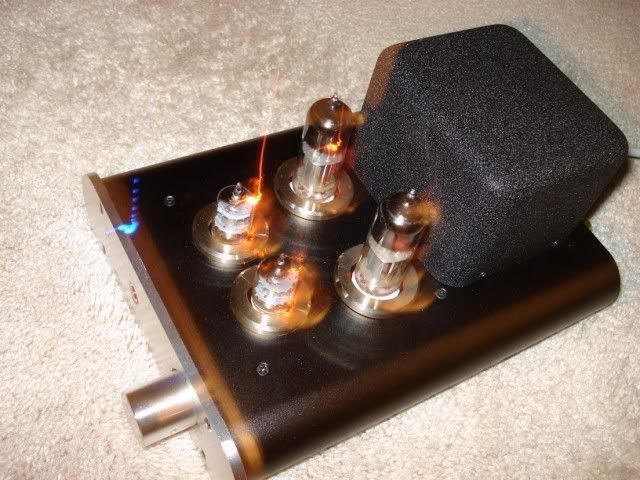
Three amps compared
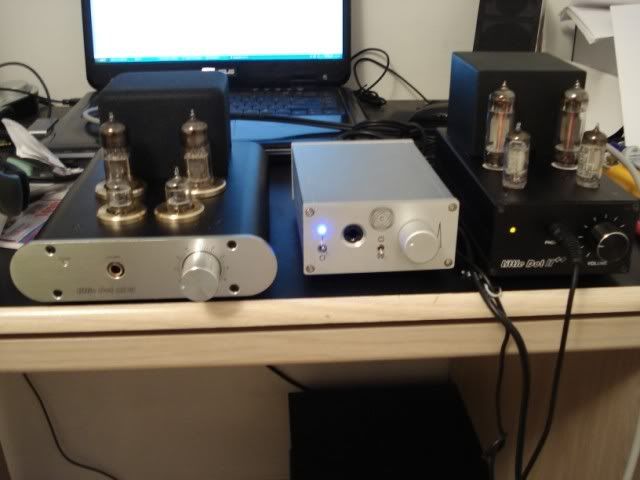
Silver tube rings glowing Gold

Tubes glowing in the dark

Bottom holes for switch operation
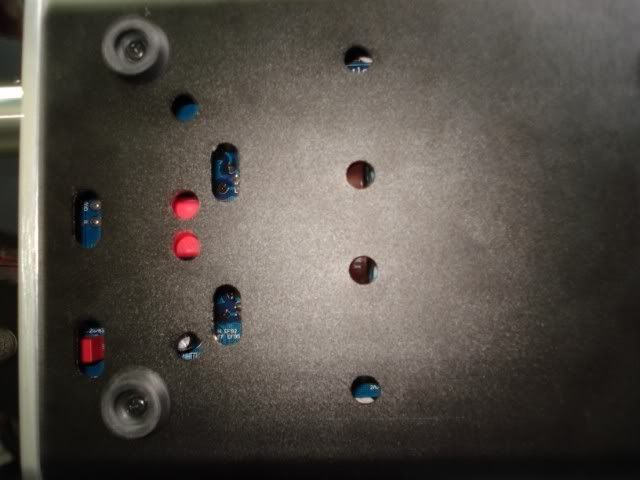
Beresford TC7510 Connected
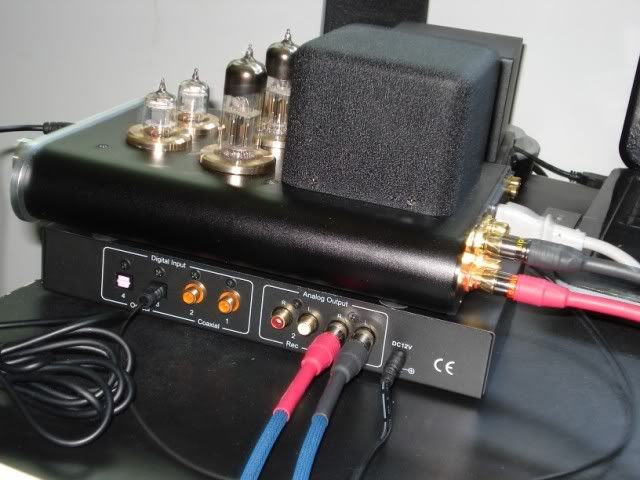
The Ultimate Combo (Beresford + Signal Cable + Little Dot + HD595 )
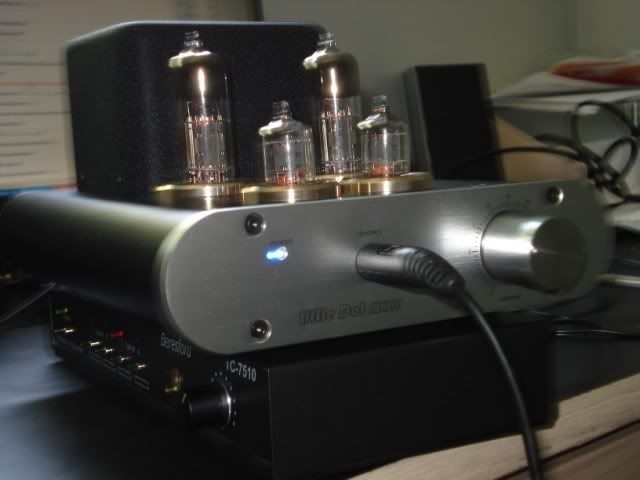
You can read the latest edition of this review and see more pics on www.compudio.ca
Yet, Mr. Yang and his company did not stop here. They have continued to improve their products based on customers’ reviews and comments. The latest edition of their MK series tube amplifiers (MKIII) shows that they have done their homework. How does it sound and perform? Read on…
[size=x-small]Technical Specs:
1. Input terminal : RCA audio input socket
2. output terminal : RCA audio output sockets; 6.35 a headphone output socket
3. Amplification Factor: 3~ 10x
4. Frequency response: 12HZ---100KHZ (300 ohm, –1db)
5. THD+N: 0.15% (300 ohm 80mW)
6. Output power:
a) 350 mw (600/300 ohm)
b) 300 mw ( 120 ohm)
c) 100 mw ( 32 ohm)
7. Suitable Load Impedance:
Headphones amp. :32 ohm---600 ohm
Pre-amplifier Output Impedance:10 K ohm
8. Fuse Rating: 1A (user replaceable. Located in power plug)
9. Measurements: 270(depth) X 175(width)X123 (height) mm
10. Weight: 3 Kg[/size]
Construction (9.5/10)
The MKIII is housed in a smooth and sturdy black metal housing. Similar to the LD2++, the transformer is also placed on top of the rear chassis. 4 tubes are inserted into the top chassis and are individually surrounded by an aluminum ring. Although the rings are of natural silver aluminum color, when powered on, the tube glow will turn the rings gold.

Noise and Heat (7.5/10)
I regret to report that the MKIII still has ground loop issues, which existed in the LD2+/++. I won’t explain how ground loop issues work, but I will tell you several solutions to solving the hissing you will experience when plugging the amp directly into your 3-pin wall outlet.
SOLUTION A: (Not recommended by electricians for safety concerns) Get a cheat-plug for the 3-pin power cord that comes with it, and eliminate the grounding pin
SOLUTION B: Get a ground-loop isolator RCA cable from your local electronics stores (ie. Radio Shack) and put it between your source and your amp’s input line
After the ground-loop issue is eliminated, the amp’s noise floor is pretty silent.
So, how about the heat? I know, the extreme high temperature is one of the most constant complaints from LD2+/++ users. I still remember someone trying to pan-fry an egg using the LD2++.

Sound (9/10)
Did I get 4 different amps with 4 different sounds? Not really. I must point out here that the new LD MKIII is one of the most hybrid amps I’ve seen. “Hybrid,” as in its flexibility towards matching headphones with various impedance and sensitivities. There are 4 modes that the amp can be set at:
[size=x-small]A: (x10) for high impedance or low sensitivity
B: (x5) for medium impedance or lower-middle sensitivity
C: (x4) for low impedance or higher-middle sensitivity
D: (x3) for low impedance or high sensitivity[/size]
These modes can be set using the tiny switches at the bottom of the amp. Unlike the LD2+/++, users no longer have to open the amp up to change settings. Rather, simply use a small screw driver to push the switch through the already-opened holes at the bottom of the chassis.
Note:
For testing most of the amplifiers, sources, and cables I’ve encountered, a pair of Sennheiser HD595 headphones is used. The HD595s have become my exclusive testing gear because of their revealing character. Moreover, the 595s are neither too forward sounding nor too laid-back; neither too dark nor too bright; achieving a status of what I called a “reference-equilibrium.”
After 30+ hours of burn-in, and 1 minute of warming-up the tubes, the audition began…
Config. A (Stock Setting)
Source: Audigy2 ZS Notebook
Cables: stock
Headphones: HD595
Once I hit the play button on my computer, the first thing I noticed was the HUGE soundstage. Did I say huge? I meant a GINORMOUS soundstage. I felt like I was in a concert hall. However, because of such large space, vocals became more laid back and even a bit echoey. Despite the large spatial presence, the percussions were very accurate. The highs were crystal-like, and were not at all piercing to the ears. The bass was definitely very powerful, although somewhat bloated and lacked impact. Like many tube amps, the emphasis was on the mids. The sound was also detailed, with a hint of it lost in the huge soundstage. Comparing to the LD2+/++, the mids were not as liquid-like and vocals were not as intimate. Nonetheless, this high power configuration is perfect for classical lovers, as strings and instrument placements are all perfectly portrayed. I really felt like I was in a concert hall!
Config D
Source: Audigy2 ZS Notebook
Cables: stock
Headphones: HD595
This low-impedance high sensitivity setting is the one that matches my 50ohm HD595. As such, this part of the impression is much more accurate than the previous config. First impression was that the soundstage had been significantly reduced while retaining an extremely impressive spatial presence. The once bloated bass got much more tightened. The lows were punchier and had better decay. They were also cleaner. Music and vocals turned more intimate, although still not as liquid-like and emotional as I had enjoyed on the LD2+/++. The highs stayed crystal-like and were not invasive at all. Moreover, the entire sound became more detailed. However, the bass was still not as punchy as I’d like and lacked the attack that I so enjoyed in the LD2+/++. Furthermore, because the low-mids were emphasized, the higher-mids seemed a bit hidden. This character is great for male vocals, and not as representative for female vocals.
Below is a sound comparison between the LD MKIII and the LD 2++ and between the MKIII and the Corda Headfive (Solid-State), using the same source, headphones, and cables
MKIII vs. LD2++
MKIII:
-More details
-Cleaner
-Better soundstage
-Better percussions
-Less colored
-Better separation
-Better accuracy
LD2++:
-More emotional
-More liquid-like mids
-More Emphasis on lower-mids
-Stronger bass attack
-Bass less punchy
-Lower bass emphasized
MKIII vs. Corda Headfive (both are rather similar except in the following areas)
MKIII:
-Larger bass presence
-Better soundstage
-Mids are more silky
Headfive:
-Better upper-mids
-Better lower-highs
-More transparent
After all these comparisons, I still did not believe that the LD MKIII had reached its potential. As such, I decided to put in a better source and better cables. When everything was connected, miracle happened.
Source: Beresford TC-7510 MKIII
Cables: Signal Cable Analog Two
Headphones: HD595
The combination brought a satisfying grin on my face. While retaining the impressive soundstage, vocals became much more intimate and were now be on par with the LD2++ in terms of evoking one’s emotions. The once lacking higher-mids had returned! Bass stayed powerful, while punch and attack significantly increased. Listening to Pink Floyd had never been so impressive. The wowing soundstage coupled with the large bass presence turned Pink Floyd into god. The LD MKIII combo trumped the Headfive combo (same source and same cables) in almost every way. What more can I say? It’s just… incredible!
----------------------------------------
Scores breakdown (best setting/combo):
Highs: 8/10
Mids : 8.5/10
Lows: 8.5/10
Soundstage: 10/10
----------------------------------------
Conclusion (9/10)
Mr. Yang and Little Dot have finally done it! They have come up with a one-of-a-kind product that totally blew my socks off. The various impedance-matching modes are a great feature that makes switching much more access-friendly. Besides the MKIII’s impressive built quality, the product proved itself to be a great powerhouse. Whether handling the low-impedance Sennheiser HD595 or the current-hungry AKG K501, doing it all through one amp has never been easier. Furthermore, the crystal highs, the silky mids, and the powerful lows are all very accurately portrayed. The highlight of the MKIII is its incredible soundstage. Not only is it large, but it also proves to be accurate through 3 dimensional spatial presence and instrument separation. The soundstage enlarges as more powerful modes are selected through the switching feature. Lastly, the portrayal of the amp’s sound is a mix of the emotions and the warmth of vacuum tubes and the accuracy and details of sound found in many solid-state amps. This highly flexible tube amplifier is suitable for numerous headphones; it’s like getting 4 amps for my HD595! And at a budget-price of mere $200 plus shipping, I say, come enshrine the LD MKIII!

End note: It seems that this amp has various tube rolling capabilities. Besides the EF95/CV4010 etc. tubes, there is also a switch that can allow the MKIII to utilize EF92/91/CV131 etc. type tubes. Hurray for flexibility; boohoo for my wallet.
Pics:
A Glowing LD MKIII

Three amps compared

Silver tube rings glowing Gold

Tubes glowing in the dark

Bottom holes for switch operation

Beresford TC7510 Connected

The Ultimate Combo (Beresford + Signal Cable + Little Dot + HD595 )

You can read the latest edition of this review and see more pics on www.compudio.ca

